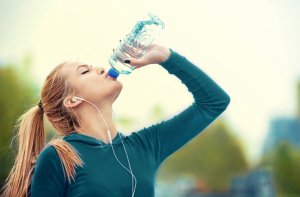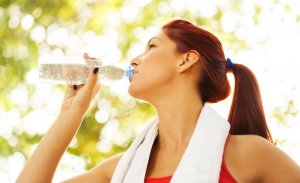How Much Water Should You Drink When You Exercise?

Water is an essential part of good health. Maintaining a high level of physical activity without staying hydrated, makes absolutely no sense at all. That’s why is always important to have enough drinking water available while you exercise.
Water is life
This statement is far more than just rhetorical, especially when you consider that 70 percent of your body weight is liquid. Besides, your body also needs water to facilitate each one of the physico-chemical processes; such as, burning calories or muscle tone.
Moreover, nutrients are distributed to all of your internal organs via water. Therefore, it’s also necessary that you stay hydrated so that your digestive system can benefit from food properties.

Fundamental fuel
Losing fluids isn’t only inevitable, but also necessary. You’re using your body’s water reservoirs just by breathing, so when you pee or sweat, you are using them even more.
These water reservoirs must be refilled as soon as possible. Therefore, having enough water to drink when you workout isn’t optional or a luxury, it’s completely necessary.
Consequences of not drinking water during physical activity
When dehydration is chronic, you’re at risk of serious or even permanent injuries. In most dramatic cases, it can be potentially deadly.
Your performance decreases when your body needs to replace liquids. Fatigue increases and your mental clarity and focus are reduced. Additionally, your post-exercise recovery becomes slower.
Likewise, other common conditions can occur from not drinking enough water, conditions that aren’t necessarily related to a daily workout routine.

Cramps, muscle strains and lack of strength, energy and vitality are among other physical consequences of not drinking enough water.
How much water should you drink when you workout?
In absolute terms, each person should drink at least two liters of water everyday; but professional or amateur athletes, with continuous training routines, need to drink even more. This consumption must be equally distributed throughout the day.
When it comes to sports and hydration, you have to keep in mind the need of drinking enough water before, during and after your workout. Although the amount of water you need can depend on factors, such as the type of physical activity you’re going to do and where you’re going to do it.
Before
Generally, you should drink at least one liter of water, 90 minutes before you begin your workout. This will allow your muscles and joints to quickly adapt to the exercise.
During
Many amateur athletes and people who work out independently, feel that drinking water as they exercise, can be difficult.
Even so, when it comes to high-intensity aerobic exercise, it’s necessary to drink at least 6.7 fluid ounces of water–around three small sips, every 15 minutes.
After
To start whole-body recovery as soon as possible, you should drink water as soon as you finish your workout. As in the preparation process, you should have at least 1 liter of water available to drink during the first 10 minutes after your workout.
It’s best to drink water
You can find plenty of isotonic drinks and other formulas ‘especially’ made to complement your workout; but water is the recommended drink when exercising. Many energy drinks contain unhealthy ingredients, and high levels of sugar.

A good option for varying the taste of what you drink, is making fruit juices, such as apple or orange juice, but with low amounts of sugar. You can also drink natural tea without any kind of sweeteners. Shakes, juices and other homemade drinks are the best tool to repair your muscles.
Water is an essential part of good health. Maintaining a high level of physical activity without staying hydrated, makes absolutely no sense at all. That’s why is always important to have enough drinking water available while you exercise.
Water is life
This statement is far more than just rhetorical, especially when you consider that 70 percent of your body weight is liquid. Besides, your body also needs water to facilitate each one of the physico-chemical processes; such as, burning calories or muscle tone.
Moreover, nutrients are distributed to all of your internal organs via water. Therefore, it’s also necessary that you stay hydrated so that your digestive system can benefit from food properties.

Fundamental fuel
Losing fluids isn’t only inevitable, but also necessary. You’re using your body’s water reservoirs just by breathing, so when you pee or sweat, you are using them even more.
These water reservoirs must be refilled as soon as possible. Therefore, having enough water to drink when you workout isn’t optional or a luxury, it’s completely necessary.
Consequences of not drinking water during physical activity
When dehydration is chronic, you’re at risk of serious or even permanent injuries. In most dramatic cases, it can be potentially deadly.
Your performance decreases when your body needs to replace liquids. Fatigue increases and your mental clarity and focus are reduced. Additionally, your post-exercise recovery becomes slower.
Likewise, other common conditions can occur from not drinking enough water, conditions that aren’t necessarily related to a daily workout routine.

Cramps, muscle strains and lack of strength, energy and vitality are among other physical consequences of not drinking enough water.
How much water should you drink when you workout?
In absolute terms, each person should drink at least two liters of water everyday; but professional or amateur athletes, with continuous training routines, need to drink even more. This consumption must be equally distributed throughout the day.
When it comes to sports and hydration, you have to keep in mind the need of drinking enough water before, during and after your workout. Although the amount of water you need can depend on factors, such as the type of physical activity you’re going to do and where you’re going to do it.
Before
Generally, you should drink at least one liter of water, 90 minutes before you begin your workout. This will allow your muscles and joints to quickly adapt to the exercise.
During
Many amateur athletes and people who work out independently, feel that drinking water as they exercise, can be difficult.
Even so, when it comes to high-intensity aerobic exercise, it’s necessary to drink at least 6.7 fluid ounces of water–around three small sips, every 15 minutes.
After
To start whole-body recovery as soon as possible, you should drink water as soon as you finish your workout. As in the preparation process, you should have at least 1 liter of water available to drink during the first 10 minutes after your workout.
It’s best to drink water
You can find plenty of isotonic drinks and other formulas ‘especially’ made to complement your workout; but water is the recommended drink when exercising. Many energy drinks contain unhealthy ingredients, and high levels of sugar.

A good option for varying the taste of what you drink, is making fruit juices, such as apple or orange juice, but with low amounts of sugar. You can also drink natural tea without any kind of sweeteners. Shakes, juices and other homemade drinks are the best tool to repair your muscles.
This text is provided for informational purposes only and does not replace consultation with a professional. If in doubt, consult your specialist.








